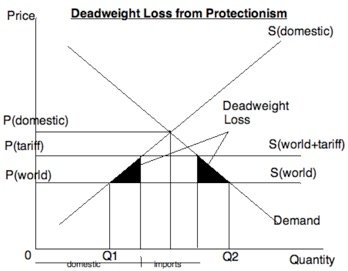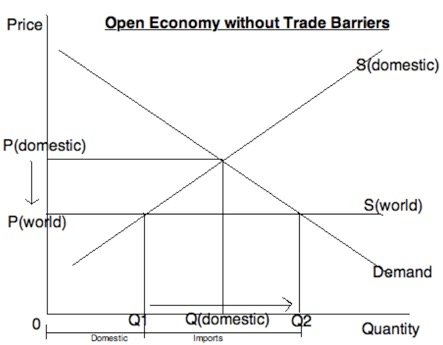Moving Towards A Free Market - An Economics Commentary
This commentary is based on the free trade agreement that was recently signed between the European Union (EU) and Vietnam. Free trade agreement (FTA) is a agreement to form a type of trade bloc between two or more countries to eliminate protectionist barriers to trade such as tariffs, quotas and other restrictions. A reduction of trade barriers leads to a more stable and transparent trading and investment environment, making it easier to export or import goods and services between the countries who are part of the agreement. A tariff is a form of taxation that is imposed on a good or a service that is imported into the country. On the other hand, Quotas are limitations set by the country, on the number of imported goods or services allowed to import into the country. In this commentary, the focus will be on the European side of the agreement as opposed to the Vietnamese.
This article reports that the Free Trade agreement erases more than 99 percent of the tariffs between the two economies, over a period of seven years. The elimination of tariffs will help markets between EU and Vietnam to reduce dead weight loss, which is a cost due to the inefficiency of economy.

By initiating a free trade, EU and Vietnam will be able to eliminate th dead weight loss from the tariffs. Deadweight losses are costs that are caused by the inefficient spending of resources by industries. These costs are often passed on to the consumers, thereby increasing the cost burden on the consumers. Due to the reduction in tariffs because of the free trade agreement, the prices of goods will decrease from P(tariffs) to P(world). The deadweight losses caused by industries will reduce, getting rid of the burden from the consumers.

As EU and Vietnam get rid of tariffs, there will be several benefits for the consumers. The EU benefits from the imports of mobile phones and other electronics, footwear, textiles and agricultural products such as rice, coffee and also seafood. On the other hand, Vietnam benefits from the import of high-tech products including machinery and equipment, aircraft vehicles and pharmaceuticals. Due to the import of these goods, there will be a drastic increase in the production of these goods, resulting in an increase in employment in these sectors as well as a reduction of prices of these goods in the domestic market, as indicated in the figure by P(domestic) to P(world). As the goods become cheaper, the quantity demanded will also increase from Q1 to Q2.
The free trade agreement will benefit efficient more than other industries as they gain in the share of other countries market. EU companies manufacturing Machinery and equipment, aircraft vehicles and pharmaceuticals will benefit the most due to their competitiveness and efficiency. Similarly, Vietnamese companies producing mobile phones and other electronics, footwear, textiles and agricultural products such as rice, coffee and seafood will benefit the most. These industries would not lose market share to the respective industry in the other country. For example, Vietnamese industries producing machinery and other equipments will not able to take over the European markets due to their high price P(World) compared to the European industries low domestic price P(domestic). Therefore, the supply curve will shift to the right, moving above from the equilibrium position. Similarly, the Vietnamese industries who have a n advantage over their European counterparts, will not lose any market share.
The Free trade agreement between European Union and Vietnam will have a significant impact on both economies. The major benefits will be the elimination of deadweight losses due to reduction in tariffs. The efficient industries will have he opportunity to grow and spread to various other markets and also increase their profits. Increase in the production of goods will provide employment to a vast number of people thereby reducing the unemployment rate.
The Commentary was based on this article: http://www.globaltrademag.com/global-trade-daily/news/eu-vietnam-sign-free-trade-agreement